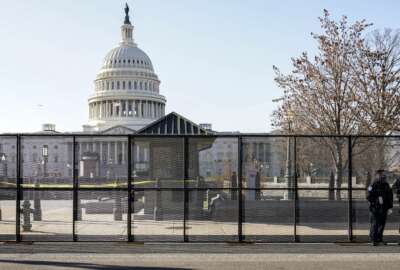
Federal government came through the riots looking about the same.
Yesterday’s statement from the Joint Chiefs of Staff is a welcome piece of perspective for those still processing the Capitol riot. The military leaders called it “a direct assault on the U.S. Congress, the Capitol building, and our Constitutional process.” They chose those words carefully.
The statement for me reinforces not the weakness but the basic strength of the nation’s institutions. For example, the military continues to respect the sharp line of civilian control. Congress, for its many faults, did resume operations later that fateful evening. Federal agencies, with their working-from-home career staffs, functioned normally.
Certain institutional components haven’t looked so good lately. For instance, Congress and various overseers are still trying to figure out what went wrong in the Capitol Hill Police planning and response.
Congress itself staggered, but only momentarily. For the first person account of one House leader, check out my interview with Mississippi’s Bennie Thompson. He’s chairman of the House Homeland Security committee. Without being overwrought, he describes the herding to a safer location, the discomfort members had in being squeezed into close quarters with some not wearing masks.
And “my wife kept calling because she was seeing what was playing out in real time on TV,” Thompson said. That reminded me of my wife’s apprehension on 9/11, when I had departed on a morning flight to Phoenix and was airborne during the same hours as the four plane crashes. These types of events are both national and personal.
When the evacuation occurred, Thompson was among those observing the counting of the Electoral College ballots. I asked if anyone thought to scoop the ballots up and take them to safety along with the Members. Thompson said he wasn’t sure, “but I do know, we got back to business. And ultimately, Joe Biden and Kamala Harris received 306 electoral votes.”
So my hope for the Biden administration is that its actions all be directed towards building the strength of the institutions, at least those in the executive branch. Doing so requires the right appointees, and the appointees’ deftness and a little humility in handling levers such as rulemaking and the federal workforce. It doesn’t mean doing things as they’ve always been done.
The next Congress could, but probably won’t, strengthen itself by listening to one other. You’d think that, given a 50-50 Senate and a 222-211 split in the House, those on each side might consider that their actions affect 100% of the citizens. But, like a battered car recovered from a hijacker, the same old Congress has returned to business. The promise of any sort of cross-party compromise looks dim.
Copyright © 2025 Federal News Network. All rights reserved. This website is not intended for users located within the European Economic Area.
Tom Temin is host of the Federal Drive and has been providing insight on federal technology and management issues for more than 30 years.
Follow @tteminWFED
